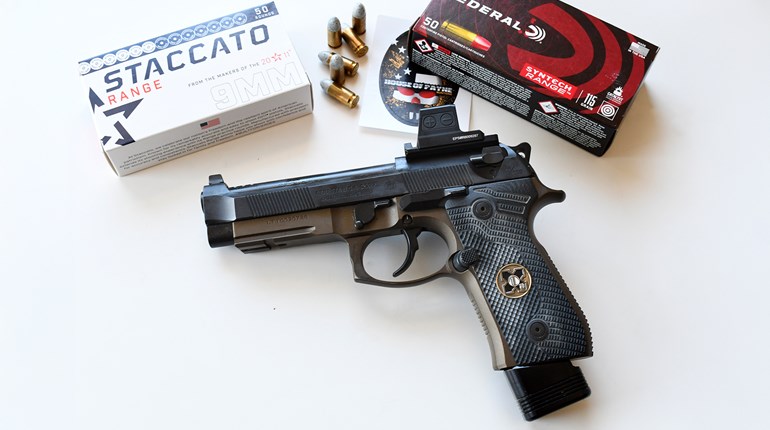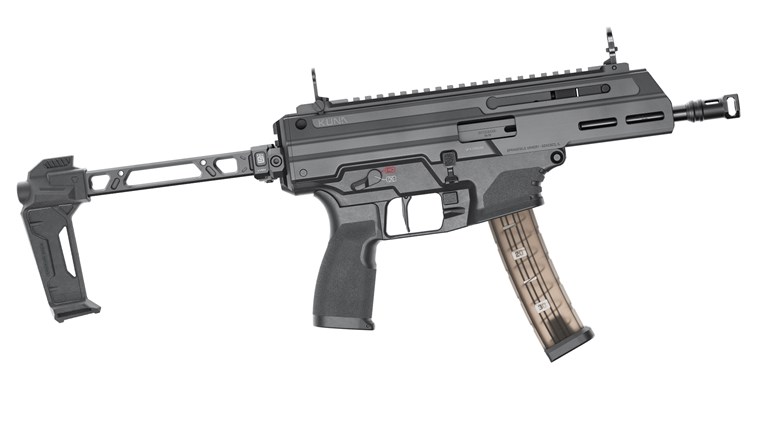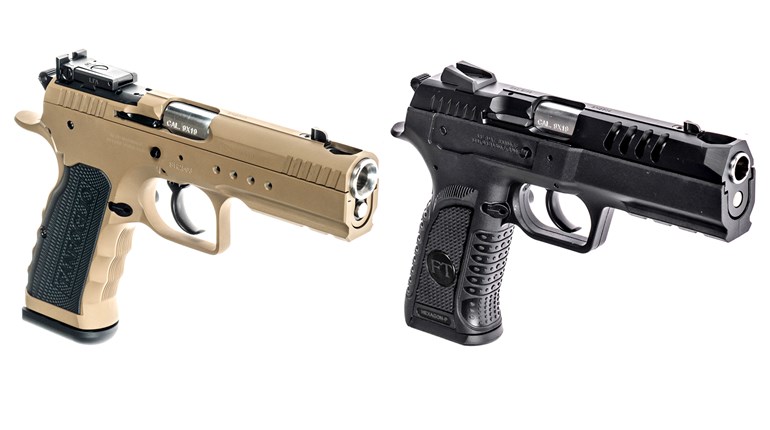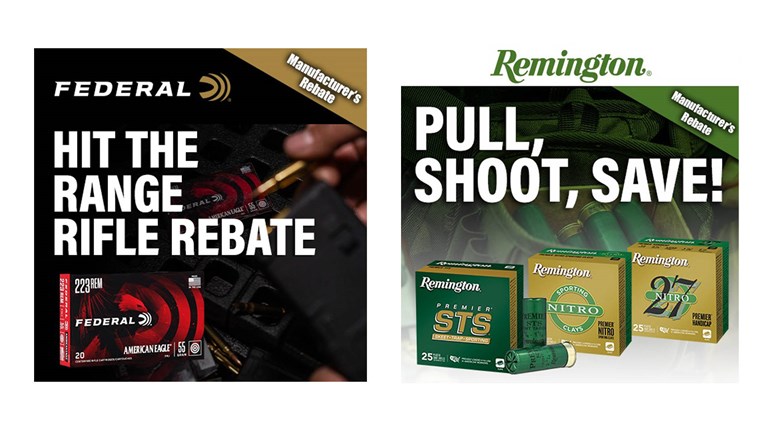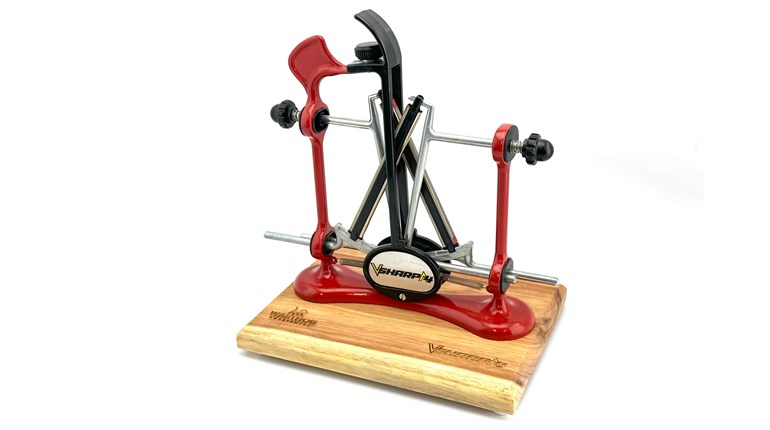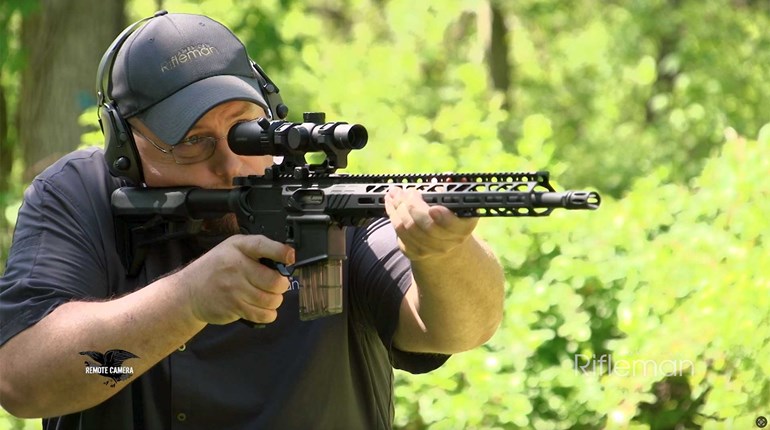
It appears the 9 mm has gained its recognition as a proper defensive cartridge; I haven’t heard anyone refer to a 9 mm pistol as a “mouse gun” for quite some time. With the incredible growth in CCW permits throughout the United States, handgun manufacturers have worked hard to reduce the size and weight of service pistols so citizens can carry a full-power 9 mm handgun properly concealed. From the early days, a leader in this movement has been Kahr Arms with its compact, striker-fired, double-action-only semi-automatics. One of its latest efforts is the Kahr Arms CT9, with an interesting polymer frame featuring a carbon-fiber-weave pattern. The surprise of this model is that while reducing the pistol’s weight and retail price, the company slightly increased the size. The result is an intriguing combination of concealed carry and home-defense handgun.
First glance reveals a stainless-steel slide and polymer frame, quite typical for a defensive handgun. The lack of a visible hammer suggests the gun is striker fired, while the open space between the back of the trigger and the frame speaks to a long trigger pull and possible long trigger reset. All true, and we’ll come back to the trigger pull and reset later. The stainless-slide configuration is all Kahr; a flat top (which some feel speeds sight alignment) with beveled edges that make the gun more user friendly.
At the front of the slide, vertical edges are beveled, which eases holster return just as it does when the front edge of the cylinder on custom single-action revolvers are chamfered. Sights are typical, three white dots with the rear sight dovetail-mounted and the front sight pinned. Both rear notch and front blade feature crisp, 90-degree edges to provide an excellent, conventional sight picture in adequate ambient light while the dots line up precisely and provide almost as sharp a sight picture in reduced-light conditions or confrontations involving a dark background. Vertical serrations at the rear of the slide facilitate manual operation of the pistol. The barrel features an integral feed ramp to ease transition of rounds from magazine to chamber. Reliability was 100 percent, with no failures to feed during testing.

But, it’s the Kahr Arms CT9’s frame that is the real eye catcher. The polymer frame features a carbon-fiber weave pattern that gives the impression the flat sides are in fact a three-dimensional surface. Though the look is non-functional, I thought it was very cool. You’re free to disagree. What is definitely functional are the treated surfaces on the sides of the grip and on the front and back of the frame. Both have a molded, waffle-like pattern that improves grip retention much like checkering but at a fraction of the cost.
Side panels resemble skateboard tape and help prevent slippage, but aren’t nearly as aggressive as tape or stippling. The bottom of the backstrap is smooth and gently rounded to be more shooter friendly and avoid those nasty abrasions that occur during extended shooting/training sessions. It seems the engineers deliberately designed the mold to produce a “dehorned” pistol rather than forcing you to deal with rough spots later.

Kahr designed an innovative trigger system for its striker-fired pistols that I think is one of the key reasons for the pistol’s success, because it’s incredibly smooth. Normally, when a striker-equipped pistol is fired, the cycling action of the slide partially cocks the striker. When the slide returns to battery, the striker is retained in the “almost fully cocked” position by the trigger bar, which is attached to the trigger. When the trigger is pressed, it moves the trigger bar rearward, in turn pushing the striker back into the fully cocked position.
Near the end of the trigger’s travel, the striker is released and fires the pistol. In Kahr actions, the trigger bar does not contact the striker, but instead is attached to a cocking cam, holding the striker in the partially cocked mode. When the trigger is pulled—and not before—the cocking cam moves the striker to the fully cocked mode before finally releasing it. Trigger pull is constant without stacking, thanks to this design. The cam changes the mechanical advantage of the trigger to deal with the increased resistance of compressing the striker spring.

Like most striker-fired pistols, the Kahr Arms CT9 has no external safety, or at least none that require a de-activation motion separate and distinct from simply placing your finger on the trigger. The Kahr’s long trigger pull acts essentially as a “passive” safety, much like the long trigger pull on a double-action revolver. The CT9 also has a long trigger reset, almost the entire trigger travel distance. Initially I had more trouble with the length of trigger pull than I did with the reset distance, but the trigger-pull issue resolved itself quickly due to the smooth consistency of the trigger press.
Reset was a non-issue during range sessions, where I collected velocity and group-size data, but that was because I could change my concentration from sight picture to trigger reset after firing each round. Running multiple-round drills on multiple targets was a different story, requiring me to maintain focus on threat solution with no mental transition to trigger reset. Run some range drills that create mental pressure and require some speed to see if you’re comfortable with the entire Kahr trigger system. With a little practice, I think it’s easy to use, but it does require a bit of re-acclimating if you’ve been using guns with different types of triggers.

There’s no second-strike capability with the Kahr Arms CT9. If pulling the trigger results in a click instead of a bang, simply do the tap-rack drill to reset. I don’t consider the absence of second strike as a liability given the reliability of today’s ammo. I did, however, experience one click in range sessions with the Kahr, which was caused by me inadvertently touching the mag-release button during a string of fire. When I tapped the base of the magazine, I heard and felt the magazine reseat itself. The rack chambered the next round, and I was on my way.
Learn and practice the drill and, of course, get familiar with your pistol’s controls. I like the fact that I can pull my handgun’s trigger with the magazine not fully installed. The click launched me immediately into the proper clearance drill whereas a trigger pull with no result would have made me wonder what was wrong and temporarily redirected my attention away from the threat. As they said in “Dances with Wolves” when Kevin Costner and the Native American swapped a knife for a hat, the absence of a magazine disconnect is “Good trade.”
While the CT9’s weight of 18.5 ounces doesn’t eliminate this firearm from consideration as a pocket pistol, the overall length of 6.5 inches and height of just over 5 inches won’t work in the pockets of most trousers. For me, the 4-inch barrel doesn’t pose a problem for concealed carry, nor does the slightly extended grip frame. My preferred strong-side carry (in either an IWB or OWB holster) covered by a loose outer garment keeps everything discreetly out of sight, yet still accessible.
But, with its longer handle (compared to one of the smaller Kahr 9 mms,) the Kahr Arms CT9 is more manageable in rapid fire due to the extra real estate available for a positive two-handed grip. The CT9, with its extended, single-stack magazine fits my hand quite well, so—assuming I’ve established a proper firing grip during the first step of the presentation—the pistol aligns quickly with the target as the gun comes to the firing position. With guns that don’t fit my hands well, I spend too much time trying to properly center the front sight when I should be pressing the trigger.

General rule is that the higher your grip relative to the bore axis, the faster your recovery time between shots. It’s true; a straight push rearward caused by recoil from a low bore axis is easier to deal with than the muzzle flip induced by a high bore axis. The Kahr’s bore axis is quite low compared to some other handguns, and while the 9 mm cartridge does not produce unmanageable recoil, the lower the bore axis, the quicker the gun is back on the threat.
In past articles, I’ve mentioned being able to make more precise, longer-range hits using a trigger that lends itself to staging. It’s much like cocking a double-action revolver; you simply stop pressing the trigger and hesitate for a split-second before finishing the stroke with very little remaining trigger movement. The fact that a trigger lends itself to staging suggests it is not smooth and consistent throughout its travel. As discussed above, the Kahr trigger is consistent, and in my opinion, a better choice for quick, multiple shots at typical self-defense engagement ranges.
So, while my inner gun guy loves 1911s, and my Renaissance man admires the simplicity of Glocks, I acknowledge that the Kahr Arms CT9 is lighter than a 1911, thinner than a Glock, fits my hand as well or better than either, and comes at a very economical price. If the double-duty concept appeals to you, the CT9 qualifies for both concealed carry and home defense. The future is, quite literally, in your hands.















